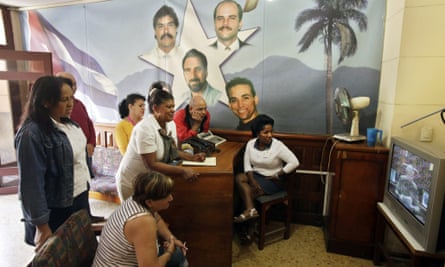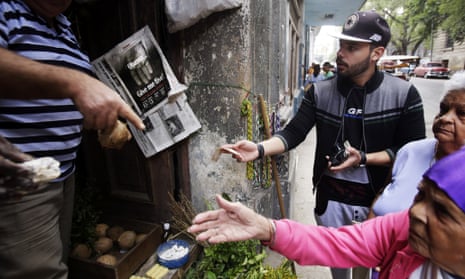The reading room of Cuba’s National Archive is normally a place of monastic calm, where academics and researchers leaf through aged volumes among card files and dusty stacks.
On Wednesday, however, the customary silence was punctuated with cheers and applause as the readers gathered around a small TV to watch president Raúl Castro announce the news that many had been waiting to hear all their lives: the planned restoration of diplomatic relations with the country’s neighbour and long-time ideological foe.
One woman looked on the verge of tears; others shook their heads in wonder. “It’s a great surprise for the new year,” said archivist Niurbus Ferrer.
Castro’s 10-minute speech, broadcast on all channels, came with little fanfare. There was no indication in the morning news that today would be any different from any other day since diplomatic relations broke off in 1961.
But a couple of hours before the broadcast, those with mobile phones received text alerts saying the president would make an important announcement at noon about Cuban-US relations. After Castro’s address, Cuban television showed Barack Obama’s speech from Washington in which he heralded “a new chapter among the nations of the Americas.”
Monica Alfonso, 26 shook her head with disbelief as she contemplated the news: “Today is a fiesta,” she said.
Recent economic reforms and gradual openings of culture and travel had prompted hopes of a rapprochement, but Wednesday’s news still came as a welcome surprise.
It was somehow fitting that the day the US and Cuba announced the end of decades of hostilities was also the feast of San Lazaro, or St Lazarus – the biblical figure who rose from the dead.
In the santería religion practiced on the island, this saint is associated with the orisha Babalú Ayé, the spirit to whom the sick pray for healing. Judging by the reaction of many Cubans, the announcement today by US president Barack Obama that the US would restore full diplomatic relations with Cuba has been considered nothing short of a miracle.
In the streets of Old Havana there was the usual bustle of traders, taxis, and tourists, but conversation focused on one subject alone, and TVs and radios were turned up to full volume as clips of Castro’s speech were played and replayed.

“There’s a lot of happiness on the street,” said Jorge Martínez, 45, one of a group of builders on a break.
His colleagues nodded as he listed the many ways things could improve if the US economic blockade is lifted – a demand which Castro made clear was still a priority for the Cuban government. Medicine and consumer goods would be more accessible, family members in Miami would be able to visit, said Martínez, who concluded: “This is going to help us – how could it not?”
Marseuska Perdomo, 38, heard about today’s deal – which included the release of 53 political prisoners – as she was picking her young son up from school. ‘The principal came out and said the prisoners were going to be released ... This is good news for Cuba. I’m so happy.”
Frank Reyes, a teacher, said: “This gives people hope of a new life in the new year. I’m very happy. I was sure things would change, but I’m not young and sometimes I doubted that I’d see this day.”
“Now my family and friends can start a new era. Little by little the door is opening. The US has been punishing the Cuban people for many years with its bad policy, but things will now change. We are neighbours. Now we can be friends.”
His 38-year-old son Fabian, the manager of a duty-free store was just as upbeat. “My whole life has been under the embargo. Now my life will change. Everything will change. This is the biggest step since the embargo was put in place in 1961. I’m happy. Life should get better.”
Other family members returned from the shops to report how people were chatting excitedly in the streets and the supermarket about the “return of the heroes” (the Cuban prisoners in the US) and the opportunity to build closer relations with the United States. Speculation has already begun that the ban on Cuban cigar exports to the US will be lifted.
Others were more circumspect: a young taxi driver who declined to give his name said: “It’s bullshit. We are still a one-party state. Cubans are living under an illusion.”
Reflecting continuing anxiety about saying the wrong thing in a nation with an often repressive record, some Cubans would only speak anonymously to a foreign newspaper.
One man, who has family connections with senior politicians, said he was optimistic that today’s developments would herald a major change in relations.
“For Cubans, this news is a big step forward. We are very optimistic about the consequences of this negotiation , especially for the economy of Cuba and the end of the blockade, which is so damaging to us,” he said.
The owner of a small bed and breakfast in Havana said he expected a boost to the Cuban economy.
“This is exactly the right thing, what we all have been waiting for,” said Máximo who only gave his first name. “More tourists will come, more US companies, maybe Havana will be full of boats from Miami one day.”

Comments (…)
Sign in or create your Guardian account to join the discussion